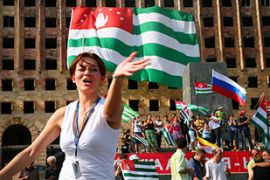Georgian leader hits out at Moscow
Saakashvili accuses Moscow of trying to “change Europe’s borders by force”.

Neave Barker, reporting for Al Jazeera from Moscow, said: “There is very little that Saakashvili’s government can do at the moment apart from attempting to solidify support inside his own country.
“What he’s doing right now is attempting to galvanise a sense of statehood, a sense of national unity and he’s using the greater international community – Europe, the United States, international institutions like Nato and the EU to try and give his leadership a degree of weight.”
Russian recognition
Russia formally recognised the independence of South Ossetia and Abkhazia, two breakaway regions inside Georgia that have received long-term support from Moscow.
| Georgia’s separatists |
|
South Ossetia is a territory of about 70,000 inhabitants, the majority of whom are Orthodox Christians, located in the Caucasus mountains. Referendums held in 1992 and again in 2006 demanded independence, but were notrecognised internationally. Abkhazia has about 250,000 inhabitants, most of whom have a Russian passport. The region makes up about 12 per cent of Georgian territory and the majority of Abkhazians are Muslim. Abkhazia unilaterally proclaimed its independence in July 1992 and separatists pushed Georgian troops from the Kodori Gorge on August 12, 2008 – the only part of the region Georgia had controlled. |
The move follows the recent conflict between Russia and Georgia, prompted by Georgia’s attempts to re-establish its authority over South Ossetia.
“I have signed decrees on the recognition of the independence of South Ossetia and Abkhazia,” Dmitry Medvedev, the Russian president, said on Tuesday in a pre-recorded address on national television.
“This is not an easy choice but this is the only chance to save people’s lives,” he said.
Vitaly Churkin, Russia’s UN ambassador, defended Medvedev’s decision, saying Georgia’s attack on South Ossetia earlier in August had negated UN resolutions – supported by Moscow – that guaranteed the territorial integrity of Georgia.
He said the conflict had created a “new reality” that justified Russia’s decision to recognise the independence of South Ossetia and Abkhazia.
But Eka Tkeshelashvili, Georgia’s foreign minister, condemned the Russian move and told Al Jazeera it exposed Russian foreign policy being about “the military invasion of soverign states, ethnic cleansing and … annexation”.
“The breakaway regions have now been completely ethnically cleansed,” she said.
Celebrations were under way in Sukhumi, the Abkhaz capital. where some jubilant residents fired shots in the air to celebrate.
Hundreds of people also gathered in the main square of Tskhinvali, the South Ossetian capital, hugging each other and waving the separatist flag.
There was a deafening roar of celebratory gunfire from Kalashnikov guns and antique hunting rifles.
Western condemnation
The West, which has backed Georgia, condemned Russia’s move to recgonise the breakaway regions.
Condoleeza Rice, the US secretary of state, said Russia’s move was “regrettable” and vowed the US would not let any attempt to recognise the regions’ independence through the UN Security Council.
Germany, which has strong economic ties with Russia and is traditionally less critical of Russia in groups such as the EU and Nato, also reacted sharply.
“This contradicts principles of territorial integrity as a fundamental right,” Angela Merkel, the German chancellor, said on a visit to Estonia, a former Soviet republic.
Nato also rejected Russia’s decision.
The alliance confirmed this year that it would press ahead with Georgian membership, a move that has angered Moscow.
EU leaders including Merkel are to hold an emergency meeting in Brussels next week to discuss their response to Russia, which still has troops in Georgian territory.
Russian forces began to withdraw from Georgia last week, but Russian forces have not pulled back to their positions before the crisis, as Moscow agreed to do under a peace deal brokered by Nicolas Sarkozy, the French president.
